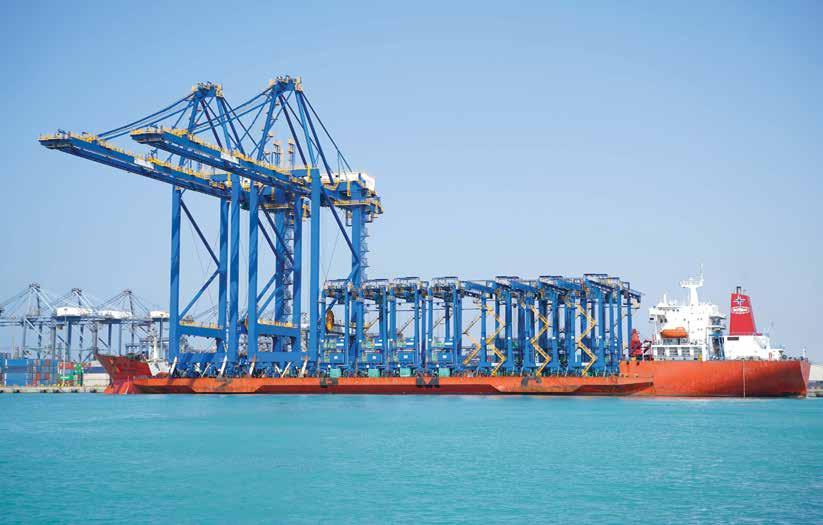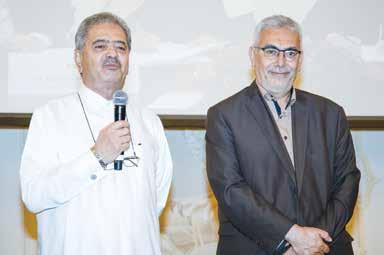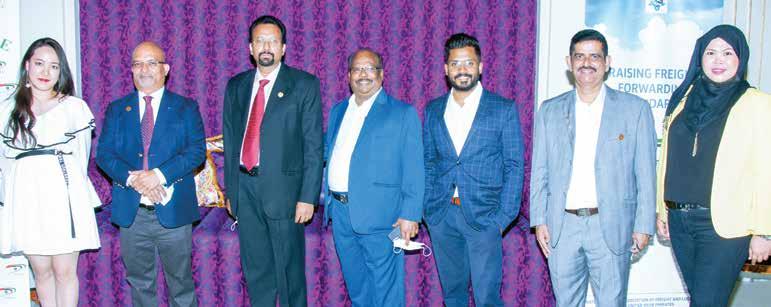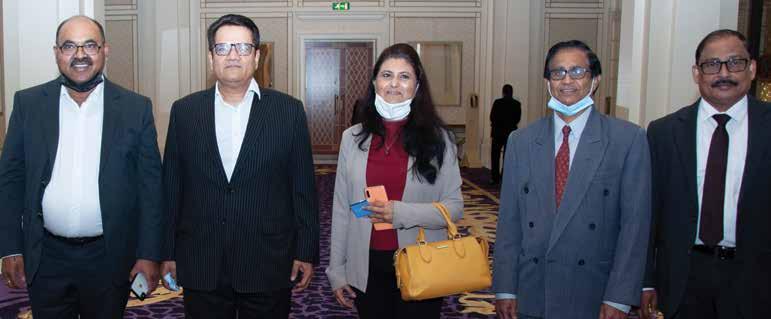
15 minute read
RSGT
The newly acquired Gantry Cranes at RSGT
RSGT emerging as a clear rising star and a pivotal link in the global supply chain
Red Sea Gateway Terminal, the largest operator of container handling facilities in the port of Jeddah (Saudi Arabia), is committed to developing regional and global infrastructure and facility investment to better serve the growing requirements of domestic cargo and container services. Thereby, it is assuming a larger role in the global logistics chain through targeted international expansion.

RSGT is the newest container terminal at Jeddah Islamic Port (JIP), the Kingdom of Saudi Arabia’s most significant port.
Through its layout, design, best in class equipment and cutting–edge technology this state of art terminal will enhance JIP’s overall capability to compete with the top ports in the world. Together with Tusker the adjacent Bonded & Reexport zone, this facility will create an integrated logistics hub for the Red Sea.
Red Sea Gateway Terminal (RSGT) is an international terminal operator representing a partnership between the Saudi Industrial Services group SISCO and the Malaysian Mining Company (MMC).
Their combined assets, handling capacity and experience place the terminal operations among the ten largest container terminal operators globally, with a combined annual handling capacity of 20 million TEU, and equity-weighted throughput of over 10 million TEU.
Jens O. Floe, CEO, RSGT, responded to a recent Global Supply Chain exclusive questionnaire to provide us the lowdown on a range of subjects – the genesis, evolution and developments at the port operator, its performance, the future and the impact of the pandemic, since it first emerged, on the Terminal’s operations. Global Supply Chain: Briefly,
provide us the history and origins of the RSGT?
Jens O. Floe (JOF): Red Sea Gateway Terminal (RSGT) was established at the Port of Jeddah in 2009, as the first privately-funded Build-Operate-Transfer (BOT) port terminal development project in the Kingdom of Saudi Arabia.
The US$ 510 million ‘greenfield’ project was constructed adjacent to the LogiPoint Bonded and Reexport Zone, with the dedicated purpose of becoming the primary logistics hub for the Red Sea Region.
RSGT opened with 1,045 meters of quay, six new super postPanamax ship-to-shore cranes, an alongside depth of 18 meters, and
an annual throughput capacity of 1.8 million TEU.
The enterprise began as a joint venture between the Saudi Industrial Services Company (SISCO), Xenel Industries Limited and MMC Corporation Berhad (MMC), a Malaysian-based conglomerate with port interests including terminal operations in Tanjung Pelepas, Johor and Port Klang. GSC: How have things shaped
and evolved over the past over 12 years since the formation of the terminal?
JOF: RSGT’s area, infrastructure, operations, and expertise have significantly expanded since the first vessel call in January of 2010, carrying the first of the 500,000 TEU we would cumulatively handle in our first year.
In 2011 RSGT received its first Ultra-Large Container Ship (ULCS) call with the arrival of a 14,000 TEU “Mega Vessel; RSGT, ‘Home of the Mega-Vessels’ is the only facility at Jeddah Port able to accommodate vessels of 23,000 TEU capacity and above.
In 2014 RSGT was ranked 18th in global terminal productivity (and 3rd in the Middle East) in a Journal of Commerce study, with 103 berth moves per hour with a vessel alongside. In 2017 an expansion of the main terminal was completed, and the arrival of four new Super Post-Panamax STS cranes brought the terminal’s deployment total to 14.
In 2018, RSGT surpassed the 10 million TEU’s handled milestone, and by 2019 had become the largest container gateway on the Red Sea, reaching the 12 millionth cumulative TEU milestone.
RSGT signed a new 30-year concession with the Saudi Ports Authority which became effective in 2020, taking over the operations of the adjacent Jeddah Port North Terminal facility (previous Gulftainer terminal), that resulted in a combined area of 1,500,000sqm, with 3,300m of quay length, 24 STS Cranes, and doubling annual container throughput capacity from 2.5 million TEU to 5.2 million TEU.
Container throughput at RSGT in 2020 reached 2.8 million TEU, and we currently employ a diverse staff of over 1,700 dedicated personnel. GSC: What are the future plans
for the growth of RSGT?
JOF: The strategy of the Red Sea Gateway Terminal is to continuously improve our services and infrastructure, as befitting the premier international trade gateway and logistics hub in the Red Sea Region, and to expand our international presence. A major component of the new 30-year concession agreement signed between RSGT and the Saudi Ports Authority, which officially went into effect in April of 2020, calls for the investment of US$ 1.7 billion in infrastructure, equipment, and technology toward this goal.
By 2023 RSGT will be equipped with 24 Super Post-Panamax quay cranes, 63 Rubber-Tyred Gantry Cranes (RTGs), and 4,900 reefer plugs. By 2050, RSGT’s annual container throughput capacity will reach nine million TEU.
In this way, we will be able to continue to meet the needs of Saudi Arabia’s growing role in international markets, as well accommodate the expanding trade in the Red Sea and north and east African regions.
We also continue to look for new opportunities and partnerships within and beyond the Red Sea Region; in 2019, for example, RSGT signed an MoU with the Bangladesh Ministry of Shipping, to jointly evaluate investments in, and provide operational assistance and expertise to this South Asian nation’s expanding port sector.
In January of this year, RSGT’s founding partners signed separate Share Purchase Agreements with

By 2023 RSGT will be equipped with 24 Super Post-Panamax quay cranes, 63 Rubber-Tyred Gantry Cranes, 4,900 reefer plugs and the annual container throughput capacity will reach 9 million TEU.

An aerial view of RSGT
the Saudi Arabian sovereign Public Investment Fund (PIF), and with Hong-Kong based COSCO Shipping Ports Limited (CSPL), one of the world’s largest terminal operating companies.
At the completion of the transactions, based an enterprise value of USD 880 million, PIF and CSPL will become shareholders of RSGT with 20% shareholding each, while RSGT will retain the remaining 60% majority share, and continue to operate as an independent business enterprise. GSC: RSGT is the ‘Largest
Logistics Gateway on the Red Sea’. Please elaborate?
JOF: RSGT is the largest and busiest container terminal in the Port of Jeddah, on Saudi Arabia’s Red Sea coast, astride the world’s major seas trade lane, linking Europe to Asia and Africa, as well as the Middle East.
The Port of Jeddah, which handles approximately 70% of Saudi Arabia’s import shipments, is itself the second-busiest container port in the Middle East (after Dubai), and one of the 40 busiest container ports in the world, with a total container throughput exceeding four million TEU annually.
UK-based industry analyst Drewry Maritime Research’s Port Connectivity Index Ranking places the Port of Jeddah as the top port on the Red Sea in terms of direct service links to other global ports, far ahead of King Abdullah Port, in Saudi Arabia, and Djibouti.
Regionally, Jeddah is ahead of the Port of Salalah, Oman; Khalifa Port, in the UAE; and slightly behind Jebel Ali, in Dubai (the world’s 12-busiest container port). With container volume approaching three million TEU in 2020, RSGT handles at present approximately 7% of the Middle East’s total annual container throughput.
The planned increase in RSGT’s annual throughout capacity to ultimately nine million TEU, and its proximity to bonded logistics centers such as the recently opened Al-Khomra zone, will continue to solidify RSGT’s position as the largest, and most important logistics gateway on the Red Sea. GSC: What are key takeaways/
broad observations from a corporate perspective for RSGT?
JOF: The recently announced equity share sales to Saudi Arabia’s Public Investment Fund, and to Hong Kong-based COSCO Shipping Ports, the world’s second-largest terminal operator by equity-weighted throughput, demonstrates the great confidence that the international investment community and global port and shipping industry hold in the future growth of RSGT.
The rapid growth of RSGT’s local operations at the Port of Jeddah has also caught the attention of Port Authorities, investors and shipping lines as a clear rising star and key link in the global logistics chain. GSC: How has the pandemic
impacted your business in the Saudi Arabia and the region?
JOF: It is important to note that while global trade levels dipped in response to the Covid-19 pandemic in 2020, operations continued without interruption at RSGT, and without the congestion and equipment shortages experienced by other major container ports worldwide.
RSGT was able to deliver the operational performance levels expected by clients, even as we made the necessary adjustments to office and operating procedures to conform with newly imposed health measures.
The transition to digitization of much of the paperwork associated with cargo payments and customs clearances was accelerated due to the safety procedures implemented in response to the Covid-19 Pandemic, eliminating the need for in-person visits to the terminal offices.
New procedures in response to the Pandemic included the introduction of a new RSGTChatbot service to enable customers to access services such as Real-Time Container Status, Invoice Generation, Pre-pickup Tickets, Return Depot Details, Custom Seal Number Details, and Vessel Schedules remotely. GSC: How is RSGT better



preparing to possibly avert and deal more effectively with this current situation?
JOF: In line with RSGT’s commitment to Process Excellence, we are consistently updating and improving operational procedures to anticipate and meet the emerging and evolving needs of modern container terminal operations.
Selected personnel from our team of 1,700 professionals participate in Lean Six-Sigma Training, for example, to instill this philosophy into our everyday standards of performance. We have found this to be an effective training tool, and a valuable component of our planning process, which emphasizes constant improvement in all aspects of our business and operations.
RSGT has historically strategically always aimed to create capacity and services ahead of demand. This has proven a winning strategy allowing us to cater for the largest vessels but also having the extra buffers needed when our customers require our special assistance.
The recent grounding of the ‘Ever Given’ vessel in the Suez Canal is a good example of that. While many terminals and ports got very congested RSGT was able to step up to the plate and help our customers with extra vessel calls and increased flexibility and volume. GSC: How important is
technology in the new normal scheme of things and how is it enabling and empowering operation?
JOF: As larger vessels are introduced into the global fleet, terminal operations must adjust to shorter periods of high-intensity container movements off and onto vessels during their port calls.
The challenges of efficient terminal operations and maintaining safety for all terminal workers can be met with the implementation of automation and other technology-based solutions.
The previously mentioned transition to digital documentation underway at RSGT decreases waiting times for truckers and reduces the need for personal office visits for cargo payments and clearances, saving customers time and money.
New hybrid technology on RSGT’s Rubber-Tired Gantry Cranes (RTGs), which are used to move containers within the terminal yard, combine diesel engines with battery operation to reduce fuel consumption, and harmful greenhouse gas emissions. Such advances are an essential component of modern terminal operations, and safety protocols.
On the operations side, we have recently taken delivery of two state-of-the-art Ship-to-Shore (STS) cranes, each with a 70-meter reach, and a 52-meter height from rail level. The new cranes, representing an investment of approximately US$ 22 million, will be able to accommodate the latest and largest generation of container ships in the global fleet.
The new 65-ton twin-lift capacity STS cranes, to be supplied by ZPMC in Shanghai, China, feature such advanced automation technology as a remote control; Optical Character Scanning capability; chassis alignment and automatic landing systems; vessel profiling, gantry, and trolley positioning systems; and intelligent status condition monitoring systems. GSC: Can you tell us why RSGT
would be the ideal partner for their customers?
JOF: RSGT is dedicated to providing world-class port and terminal operation to the global shipping community, with a commitment to environmental sustainability, corporate social responsibility, and workplace safety.
Our ambitious plan for the future, and established record of successes over the past 12 years, demonstrate the value of partnering with RSGT to meet the challenges of the future.
As the key logistics hub on the Red Sea, we are continuing to strengthen our vital regional presence, with a global perspective. The success of our customers is our success as well, and we strive toward that goal every day.

Terminal Trucks at RSGT
NAFL’s 2020 performance is commendable and upbeat

Industry UAE Apex Body demonstrates buoyancy and resilience in the face of the pandemic




The 33rd AGM of the National Association of Freight & Logistics (NAFL) was recently commemorated amid much fanfare in the opulent ambience of the Al Jaddaf Waterfront Ballroom of the Versace Pallazzo Dubai.
The well-attended, in person meeting, conducted amid strict enforcement Covid-19 protocols and regulations, signaled renewed hope and optimism ahead for the industry despite challenges.
Assurance
In her keynote address, Nadia Abdul Aziz, President, NAFL& Vice President, FIATA, lauded the Association’s 2020 performance and its resolve to stem the tide and buck trends. She assured that NAFL would stand shoulder to shoulder with members to empower and equip members in these challenging times.
Ms. Nadia assured the assembly that the NAFL stood rock solid behind its members and would endeavour to represent and work in their interest and to protect the interests of the industry. She expressed confidence that the current situation notwithstanding, the logistics and freight industry in the UAE would continue to grow from strength to strength.








Ms. Nadia also reiterated that NAFL aims to support its members in these difficult times, by offering them sponsored trainings after the Eid Al Fitr holidays. She advocated a culture of openness and sincerity at NAFL so that all relevant and pressing industry issues are appropriately discussed internally and then communicated and conveyed to all concerned government offices through detailed reports on the challenges and solutions.
“NAFL will stand in solidarity and in unity and pledge to work closely with our members to overcome current difficulties and sustain their businesses,” she affirmed.
Pioneer

To this end, NAFL as a long-established, responsible representative body and the first of its kind in the GCC, is also working closely with the Government, other Governmental bodies and regulators to ensure that the growth, stability and viability of the freight and logistics sector in the UAE.
Nadia further reiterated that the Government was mindful of both the importance and indispensability of the industry. Simultaneously, both representation and engagement with associates, constituents and Government are pivotal to guarantee an ecosystem for progress and productivity.
Due to Dubai’s bold initiatives and the UAE’s global connectivity and excellent infrastructure, we are the global hub for the distribution and storage of vaccines and take the top place for humanitarian aid distribution. Thanks also to the logistics industry in the UAE which has risen to the occasion to make certain that movement and distribution of goods continues unimpeded, seamless and in a streamlined manner,” she observed.


Highlights

Some of the highlights of her speech were: • NAFL will be working closely with Expo 2020 and organizers and will ensure all members are advised and trained on all rules and regulations in line with Expo procedures and contracts. • NAFL will be participating and supporting big global exhibitions during the Expo period such as Hypermotion show and the Air Show Cargo Connect
Conference. • Expo 2020 would be a great platform to network and engage with multiple national, regional and international stakeholders from over 190 participating countries.







World Logistics Passport
NAFL will continue a close interface and play an active role of the World Logistics Passport launched under the leadership, directives and initiatives of HH Sheikh Mohammed Bin Rashid Al Maktoum, Vice President & Prime Minister of the UAE and Ruler of Dubai.
The initiative, to enhance trade flows and build a network of trading mega-hubs, was launched at the World Economic Forum in Davos 2020. Members will definitely benefit from the fast expanding Global Reward Programme for freight forwarders and logisticians.
NAFL is also in the lead with a lineup of professional training and empowerment programmes in the course of 2021.
Also present at the AGM were several NAFL officials and office-bearers. These included Ahmad Abdul Razeq, Vice President; Sudesh Chaturvedi, Secretary General; Mathew Chacko, Treasurer; Majid Barzanji and Praveen Chandrasen, both Executive Board Members.










